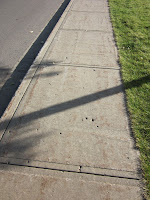School is well underway, and the Writing Services over at Student Success are in full swing. It is my second semester of working as a writing tutor...so far, I am enjoying it as much as I did last year, despite how busy it is. However, I repeatedly come across the same problem. It seems every student that comes in thinks I know the secret to what "good" writing is. They desire this information above all else. But am I really qualified to say what "good" writing is in every situation? Am I quaified to speak on it at all?
Sure, I may know better than most what those "evil" English 100 profs are looking for in their papers. That knowledge simply comes with the amount of time I have spent studying in this area. Almost any english major can inform you of grammar rules, of theses and problem-solving techniques, of structuring essays. Fewer, but still most, can tell you how to build your arguments gradually, how to cite every kind of source, how to make your ideas seem fresh and original. But are these things what make writing "good"? Isn't it true that a paper could be grammatically sound and still essentially a failure? What, then, makes a piece of writing, whether fictional or non-fictional, work?
Some people would point to the use of the personal. Others would vehemently oppose it. Some would look at the timelessness of the pieces, the essential canonical works that have outlasted their creators. Still others would point to what new techniques or insights the pieces have brought forward. So what is it? Is it shock value? Is it individuality? Is it complete and utter madness?
These things make my head hurt. How, really, can we decide which kind of writing is better than another? Is Shakespeare better than Milton? Is Munro better than Atwood, or Poe? Is a poem better than an autobiography? The academic essay really a better form than the personal? We as students are constantly getting mixed signals from profs telling us to "fit in" to one form or another, to adopt voices and styles and even ideas that are not our own. In one class we are to be literary historians, in the next, radical post-modernists. Why is this chameleon-esque view of writing seen as better? Why is it more important to plug the thesis and supporting points into the age-old five-paragraph essay format, than to build on and explore our own original voices and ideas? Since when is a grammar proficieny any indication of how powerful someone's writing is?
I think, somewhere along the way, we have lost the appreciation of writing as an art form. We have shucked off the ideas of uniqueness and personal agency in favor of fill-in-the-blank sentence structures. And we have made students feel that writing is a discipline of error and correction rather than expression. It is small wonder that so many students come into the Writing Services worried and afraid of their writing, feeling as though it will never be acceptable, wondering if there is some great secret that they have yet to discover.
Well, I say, the secret is that there is no secret. Anyone can write. We were born communal, and we have the skills to communicate ourselves in our own unique ways. Grammar is only one very small part of a "writing proficiency". Students, if you really want to write better, find yourselves again. Go searching for yourself amidst the Shakespeares and Munros of the world. Be true to yourself, and true to your experiences, because that is where your true voice and true power lies.
We English majors and writers, we master craftspeople of words and wit and creativity, we have all discovered our originality and have brought it into every single sentence we write, so that a Jayne sentence is always just a little different than another's sentence, so that the flavour and tone of our paragraphs is always a little unique. How can we hope to impact others unless we know what it is we are trying to say? Unless we understand it on a personal level? If more people strove to believe in themselves and their abilities, we would find what writing proficiency is. We would find that writing "good" is, simply, writing ourselves.
 John Wilkins," Borges describes 'a certain Chinese Encyclopedia,' the Celestial Emporium of Benevolent Knowledge, in which it is written that animals are divided into:
John Wilkins," Borges describes 'a certain Chinese Encyclopedia,' the Celestial Emporium of Benevolent Knowledge, in which it is written that animals are divided into: 










